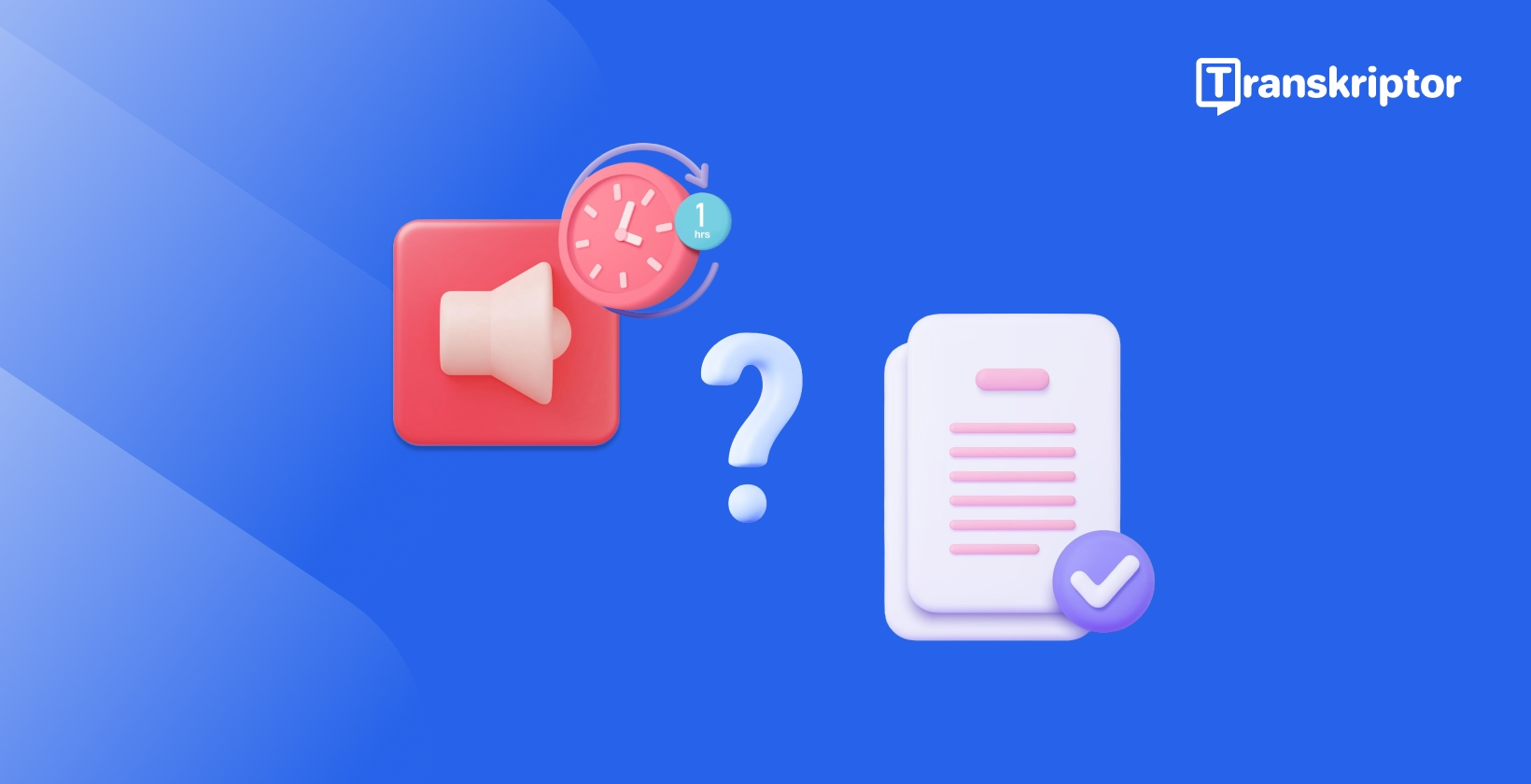
Transcribe 1 Hour of Audio in Minutes: Expert Tips & Tools
Transcribe, Translate & Summarize in Seconds
Transcribe, Translate & Summarize in Seconds
Looking to transcribe 1 hour of audio quickly and efficiently? Wondering about the fastest way to transcribe 1 hour of audio? In this guide, you will learn how to turn hour-long audio recordings into accurate text in just minutes. We will look at new transcription technology that can save you hours of work. We will also share expert tips to help you get the best results. If you need to transcribe one hour of audio, like interviews, lectures, or meetings, this guide will help you. You will learn ways to make the transcription process easier. You will also learn how to improve accuracy. By the end of this guide, you will know how to turn your long audio files into clear, professional transcripts. You can do this in much less time than usual.
Understanding Audio Transcription Time Challenges
How long does it take to transcribe 1 hour of audio? The traditional approach has always been time-consuming and labor-intensive. Transcribing one hour of audio usually takes 4 to 6 hours. This time can vary based on audio quality, the number of speakers, and the transcriber's experience. This significant time investment can create bottlenecks in your workflow and delay important projects.
For professionals working with tight deadlines, these challenges can significantly impact productivity and project timelines. Let's explore the key factors that affect transcription time and quality:
Audio Quality and Environmental Factors
Clear audio is crucial for efficient transcription. Background noise, echo, or poor recording quality can make word recognition challenging. Environmental factors such as ambient noise, cross-talk, or distance from the microphone can significantly impact the clarity of the recording. Professional transcriptionists often spend extra time rewinding and replaying unclear sections, which further extends the transcription time.
Speaker Variables
When you need to transcribe 1 hour of interviews or meetings, multiple speakers present unique challenges in transcription work. Different accents, speaking speeds, and speech patterns can complicate the process. When speakers talk over each other or don't clearly identify themselves, attributing dialogue accurately becomes time-consuming. Additionally, speakers with strong accents or regional dialects may require extra attention to ensure accurate transcription.
Technical Content Complexity
Specialized vocabulary and technical terminology require additional verification time. Industry-specific jargon, acronyms, and proper nouns need careful attention to maintain accuracy. Transcriptionists often need to research unfamiliar terms, which adds to the overall processing time.
Modern Solutions for Fast Audio Transcription

The fastest way to transcribe 1 hour of audio is through automatic transcription, which has revolutionized the industry thanks to artificial intelligence and machine learning technologies. These advances have transformed what once took hours into a task that can be completed in minutes. Here's how modern technology has changed the game:
AI-Powered Processing
Modern transcription systems leverage sophisticated AI algorithms that can:
- Process multiple speakers simultaneously
- Adapt to different accents and speech patterns
- Learn from corrections to improve accuracy
- Handle complex technical vocabulary
- Maintain consistency across long recordings
Advanced Recognition Features
Today's solutions incorporate multiple technologies to enhance accuracy:
- Natural Language Processing (NLP) for context understanding
- Speaker diarization for accurate attribution
- Background noise filtering
- Automatic punctuation and formatting
- Real-time processing capabilities
Quality Assurance Tools
Modern platforms include built-in tools for ensuring transcript quality:
- Automated spell-checking and grammar verification
- Technical term validation
- Format standardization
- Quality scoring systems
Introducing Transkriptor: Complete Transcription Solution
Looking to transcribe 1 hour audio files online? Transkriptor stands out as a comprehensive solution for handling hour-long audio transcriptions efficiently. Let's explore its core capabilities and unique features that make it the ideal choice for professional transcription needs.
Core Technology
At the heart of Transkriptor's capabilities:
- Advanced AI engine trained on millions of hours of audio
- Support for over 40 languages with natural, clear pronunciation
- Enterprise-grade security through SSL encryption
- Compatibility with all major audio and video formats
- Real-time processing capabilities
Premium Features
What sets Transkriptor apart is its suite of advanced features:
Intelligent Processing
- AI-powered summaries that automatically capture key points
- Custom templates for different content types
- Advanced speaker identification
- Automatic punctuation and formatting
- Background noise reduction
Collaboration Tools
- Team sharing capabilities
- Real-time editing
- Version control
- Comment and feedback system
- Permission management
Quality Enhancement
- Built-in editing tools
- Automated quality checks
- Format standardization
- Technical term verification
- Custom dictionary support
Step-by-Step Guide: How to Use Transkriptor
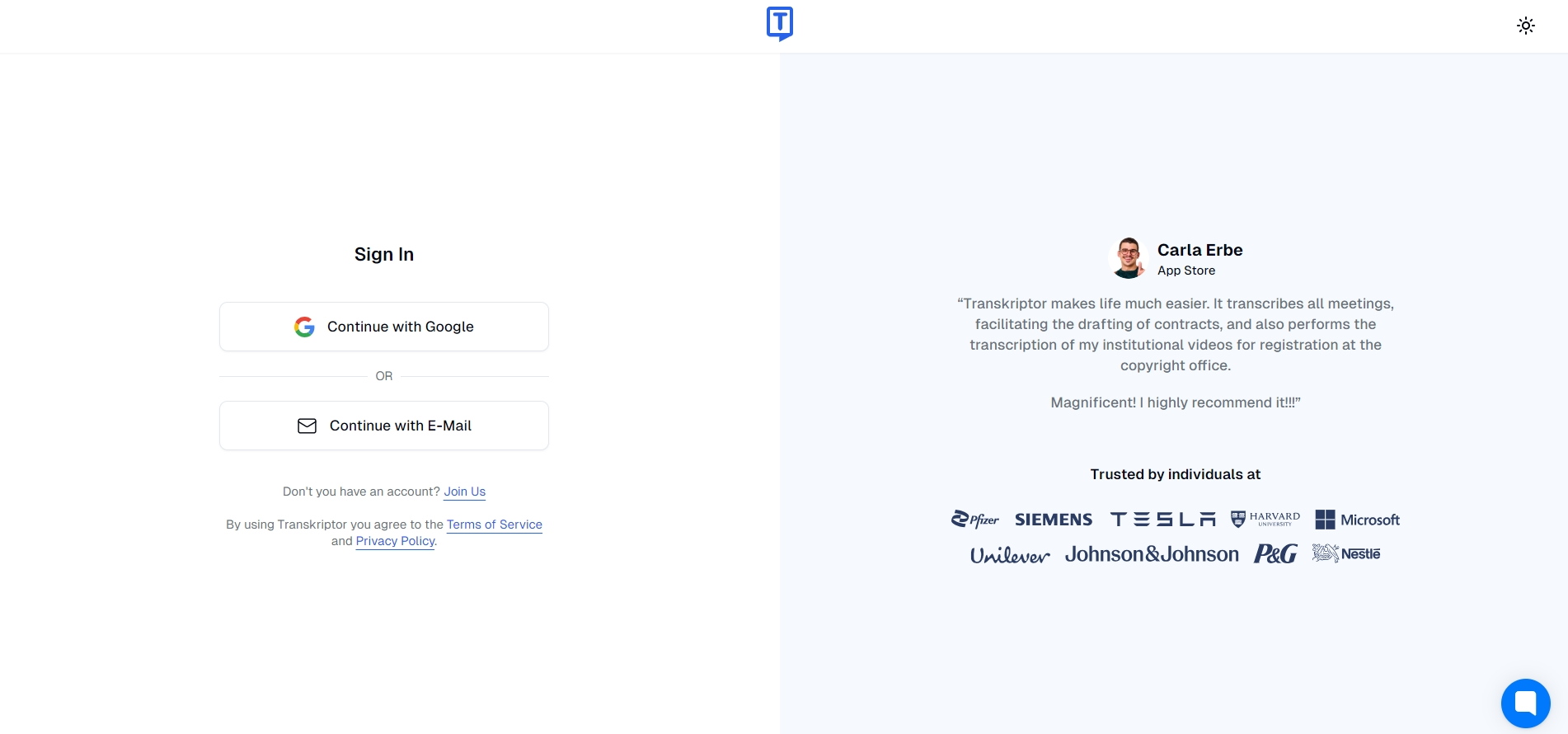
1. Sign Up or Log In
Visit the Transkriptor website and create an account using your email or Google account. Once logged in, you'll have immediate access to your personalized dashboard, where you can manage all your transcription projects.
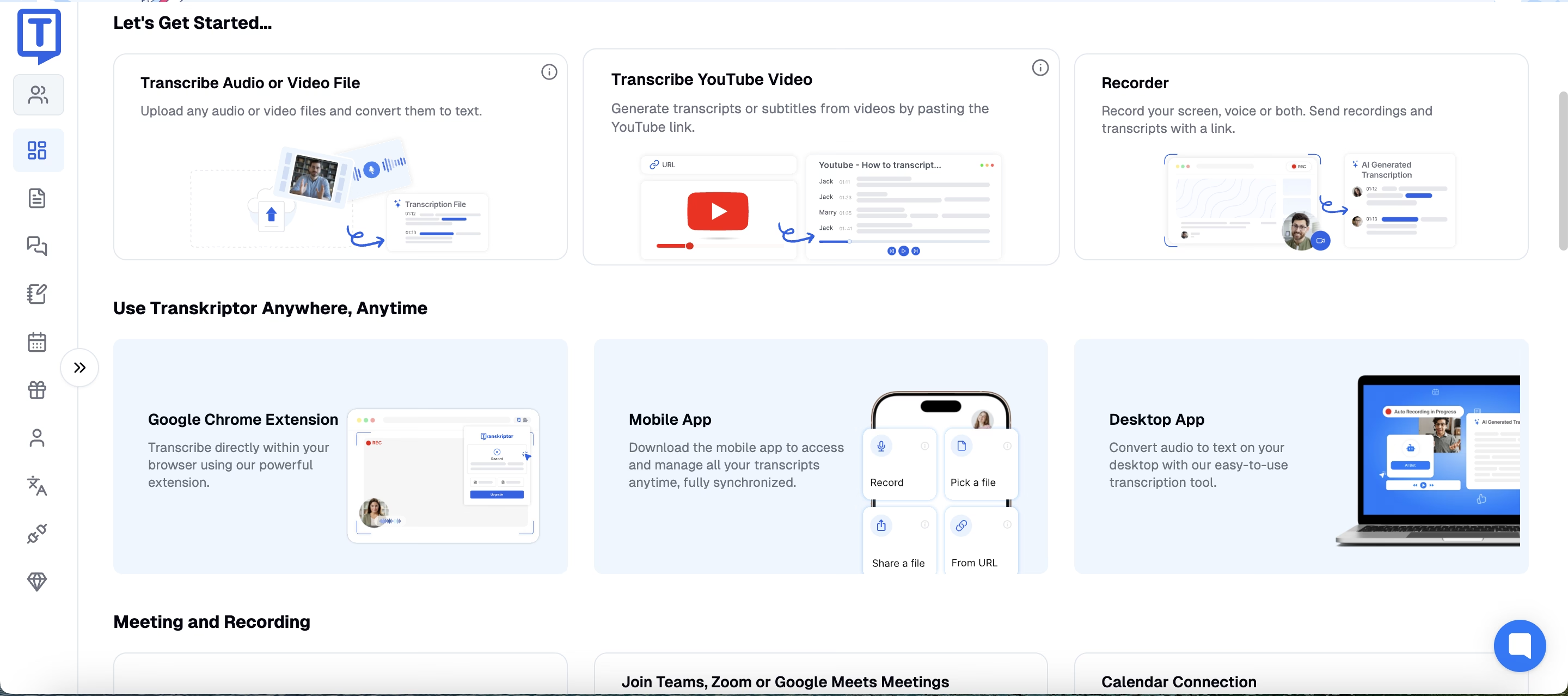
2. Upload Your File or Paste a Link
For device uploads, simply click the "Upload" option on your dashboard and select your audio or video file. Transkriptor supports various formats, including MP3, MP4, WAV, and more, ensuring compatibility with your content.
If your content is hosted online, you can use the URL upload feature:
- Click the "Paste URL" option
- Enter the direct link to your audio or video file
- Ensure proper access permissions are set for hosted content
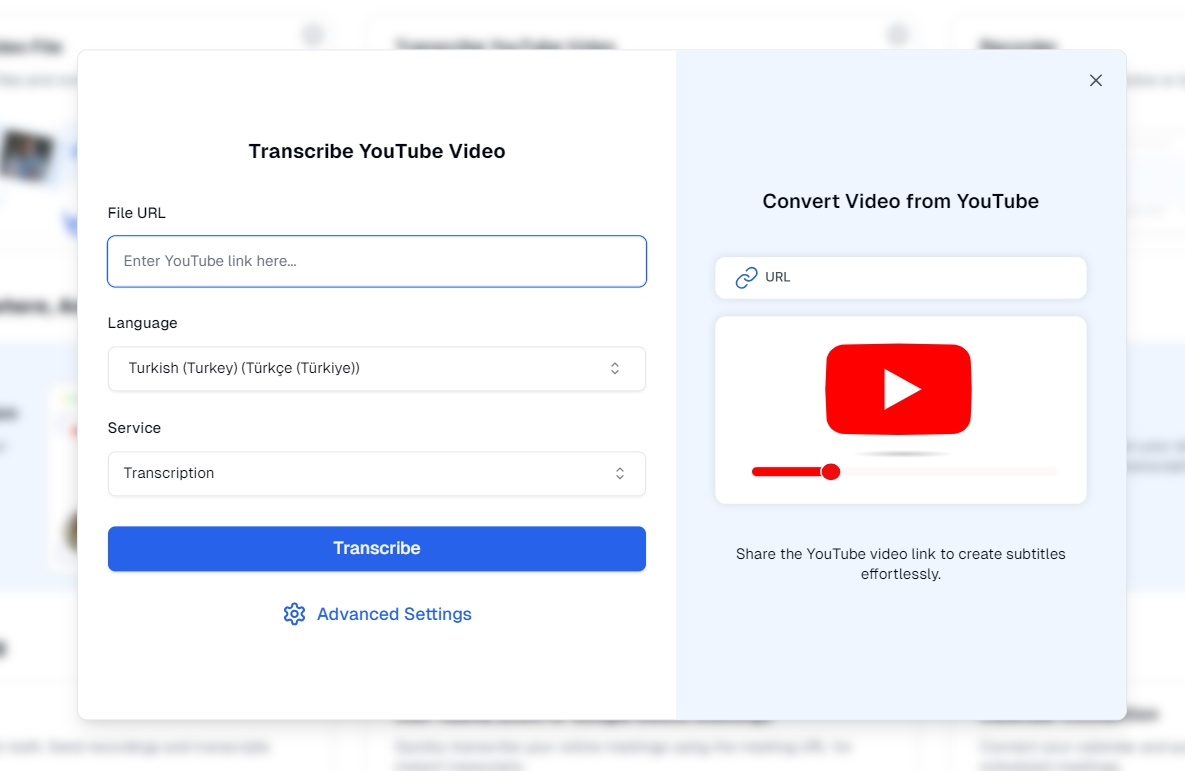
3. Select Language and Settings
Choose the language and dialect of your audio to enhance transcription accuracy. Transkriptor supports over 40 languages, making it versatile for various content types. You can also configure additional settings like speaker identification and timestamps based on your specific needs.
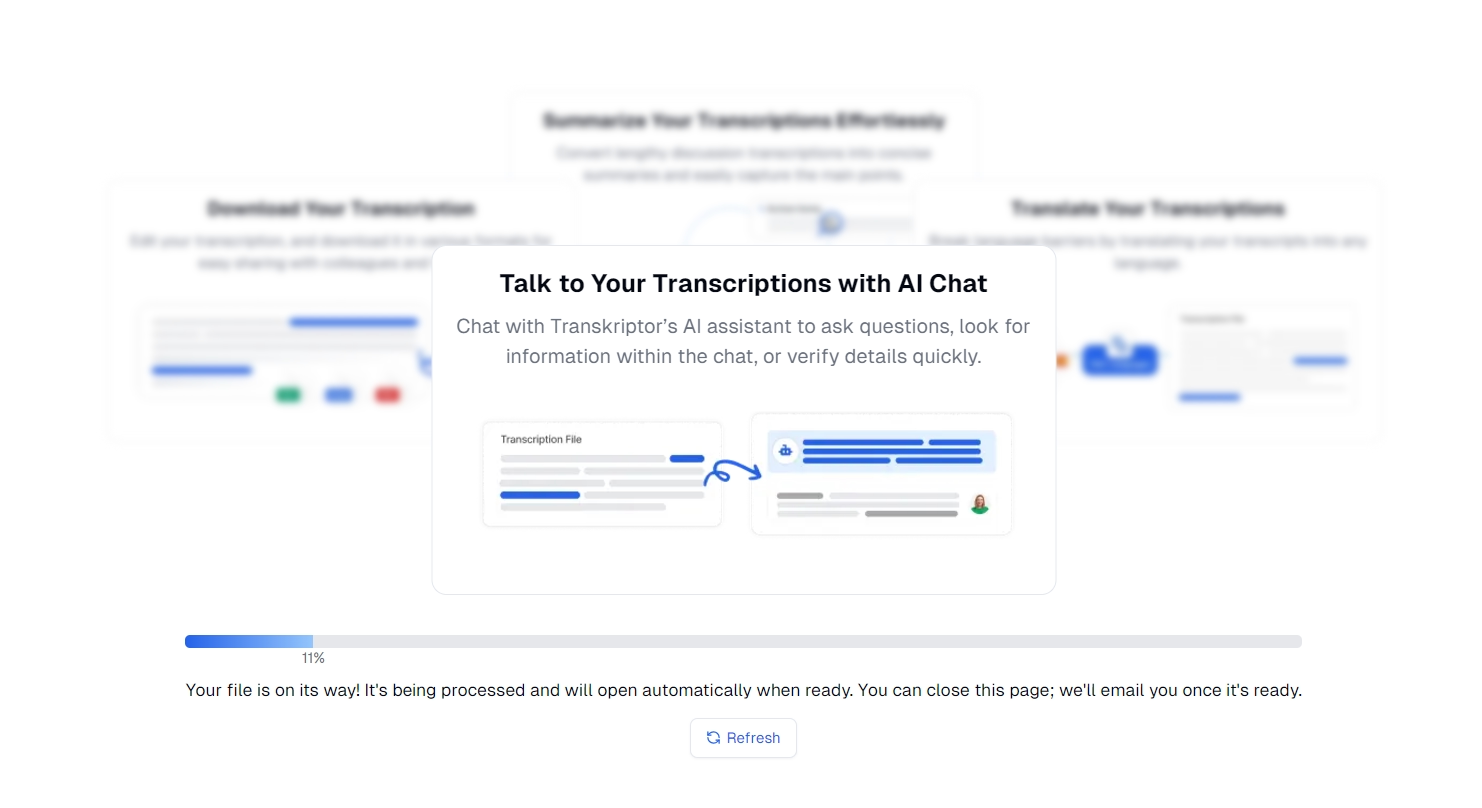
4. Start Transcription
Once you've configured your settings, click the "Start Transcription" button to begin the process. Transkriptor will automatically process your file and notify you via email when the transcription is complete. You can track the progress in real-time from your dashboard.
<video1>
5. Review and Edit
After the transcription is complete, access it through your account dashboard. The built-in editor provides a user-friendly interface for making any necessary corrections. Features like timestamps and speaker identification help you navigate through the transcript efficiently, while search and replace functions enable quick bulk corrections.
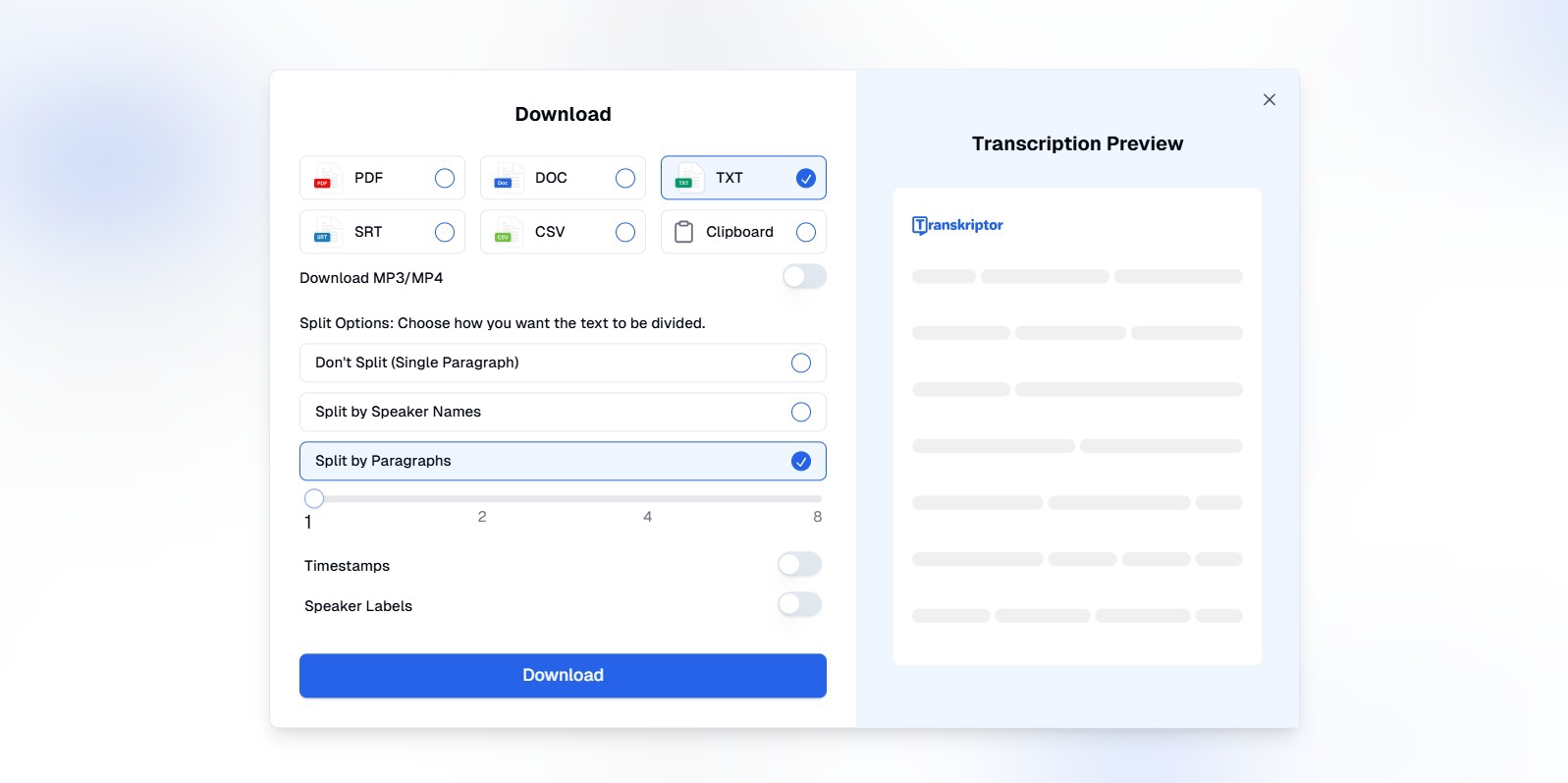
6. Export and Share
The final step is to export your transcript in your preferred format. Transkriptor offers multiple export options, including PDF and plain text. You can also share the transcript directly with team members or clients, maintaining version history for all previous edits.
Pro Tips for Optimal Results
Pre-Transcription Best Practices
Recording Quality
Recording quality significantly impacts transcription accuracy:
- Use professional recording equipment when possible
- Choose a quiet environment
- Position microphones properly
- Monitor audio levels during recording
- Test recording settings beforehand
File Preparation
Prepare your files for optimal processing:
- Verify audio quality before uploading
- Remove unnecessary sections
- Check file format compatibility
- Optimize file size if needed
- Ensure stable internet connection for upload
Post-Transcription Optimization
Maximize transcript quality with these final steps:
Review Process
- Verify speaker identification accuracy
- Check technical terms and proper nouns
- Ensure consistent formatting
- Review punctuation and grammar
- Validate timestamps
Quality Assurance
- Use built-in spell check and grammar tools
- Apply consistent styling
- Verify proper noun spelling
- Check for formatting consistency
- Review for context accuracy
Conclusion
When it comes to 1 hour audio transcription accuracy and cost comparison, transcribing hour-long audio files no longer needs to be a time-consuming challenge. With Transkriptor's advanced features and user-friendly interface, you can transform your audio into accurate text in minutes rather than hours. The platform's combination of AI-powered technology, extensive language support, and professional-grade editing tools makes it an ideal solution for all your transcription needs.
Start transcribing your audio files today and experience the difference that professional-grade automation can make in your work. With Transkriptor, you'll save valuable time while maintaining the high-quality transcripts your projects demand.
Frequently Asked Questions
Manual transcription takes 4-6 hours, but AI tools like Transkriptor process audio in minutes.
AI-powered software like Transkriptor transcribes audio quickly using speech recognition and machine learning.
Reduce background noise, use a quality microphone, and review the transcript post-processing.
Yes, Transkriptor has speaker identification to differentiate and label multiple speakers.

